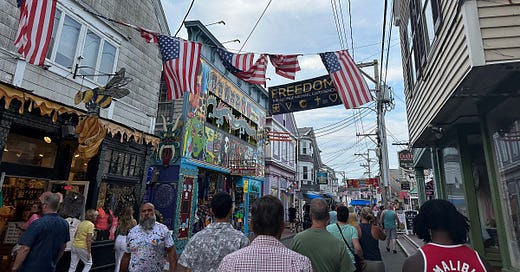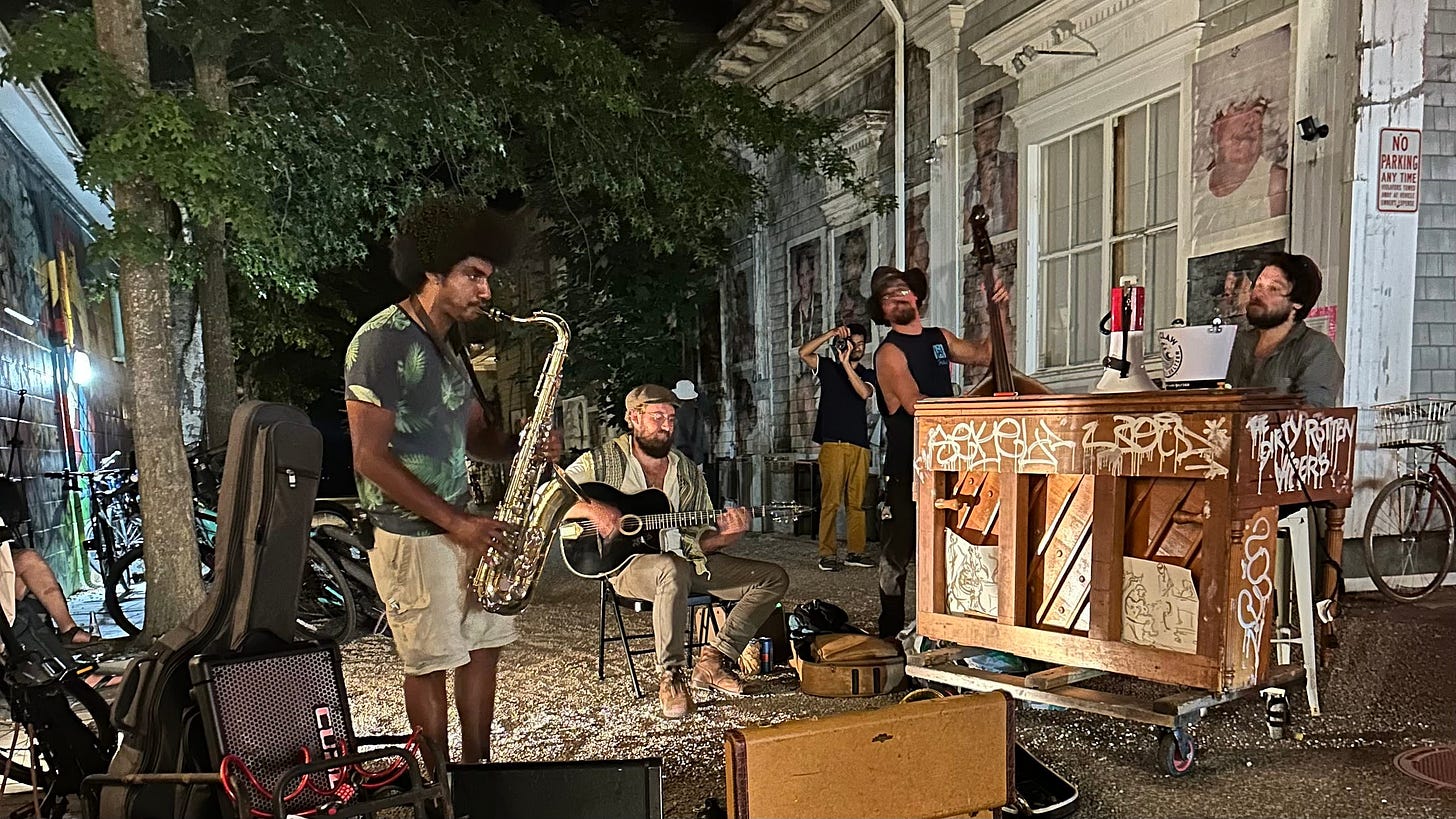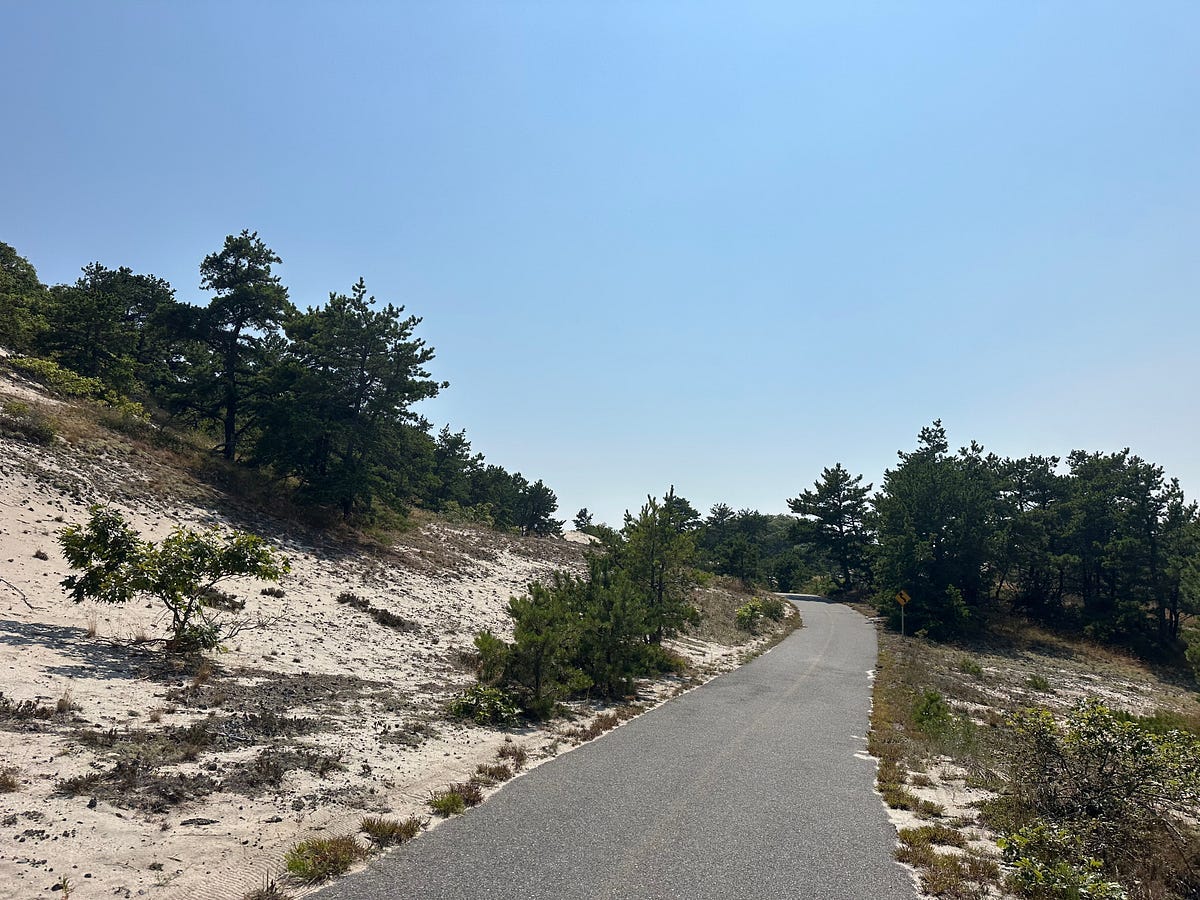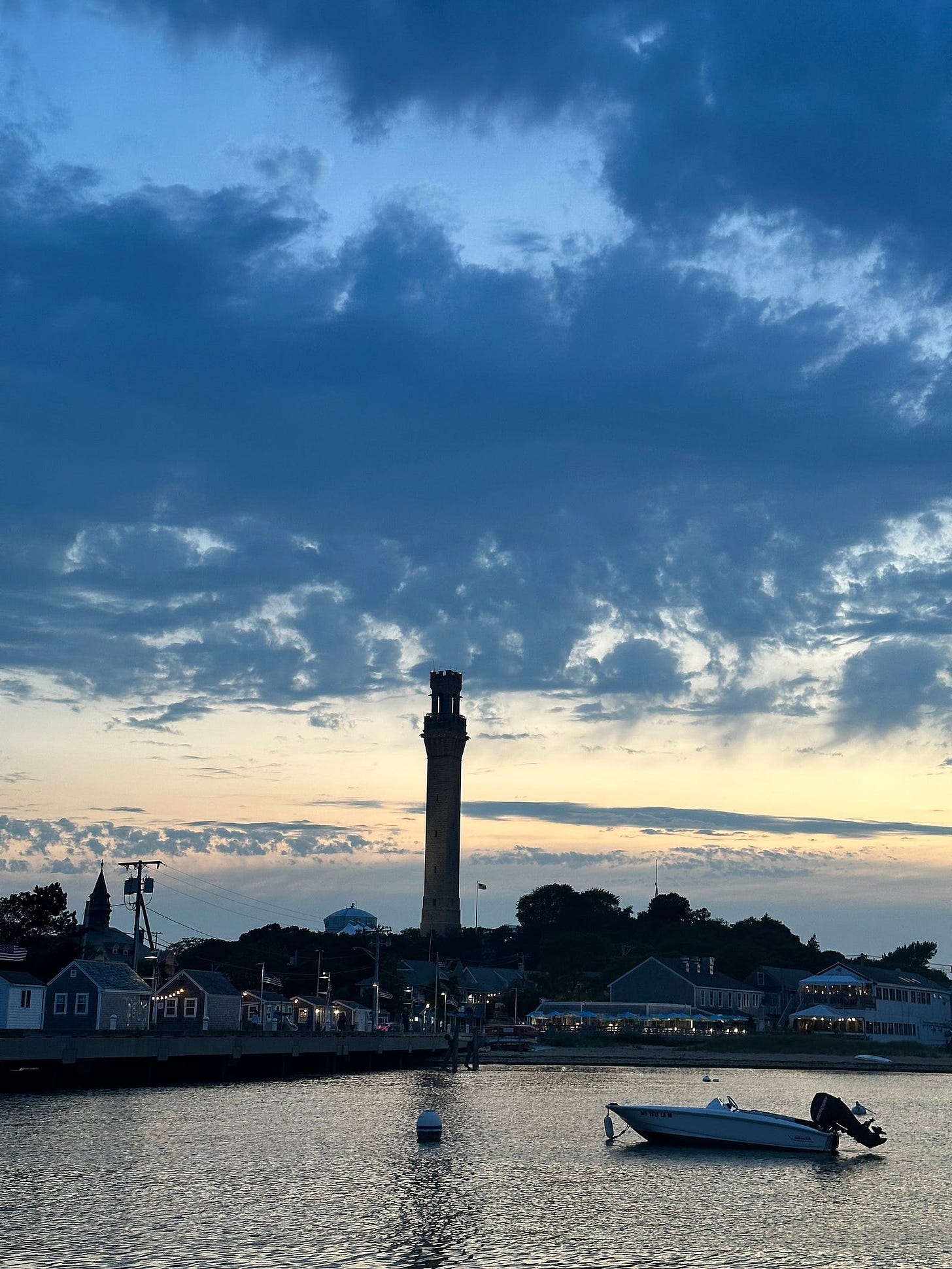Running Through the ‘Bear Fest’ in Provincetown, Massachusetts
Travel Essay: A unique town in Cape Cod, dunes, and the spirit of celebration
I walked into the mayhem of Provincetown, Massachusetts, right off the dock where I tied-off my dinghy. I paused to gather my senses. During the last two weeks, we sailed among the quiet islands of Long Island Sound, away from the noise of human joy, irritation, or traffic. They were all here now, bombastic and forceful, in my ears and thumping against my chest. But what stopped me in my tracks were the visuals. A juxtaposition that made me love this town instantly on arrival.
On the right sidewalk, two families pushed against the current of people flowing the other way. A mom and a dad, well-dressed, held hands with their son and daughter. Maybe visiting from Boston for a day by the high-speed ferry? Behind them walked a family, possibly Mennonite, with the man and two boys in white shirts and black pants and two women in long, flowery dresses and bonnets covering their hair.
On the left sidewalk walked a group of four bearded men. The two in front wore tiny, tight leather shorts. None wore a top, their big hairy bellies spilling over the shorts, their large chests covered in thick manes. Leather strap harnesses ran from the shoulders, around the globes of their bellies, and attached to the shorts. One wore knee-high boots, the other, inexplicably, Birkenstocks. They were holding hands. The two men behind them could have been their brothers.
The conservative and alternative on the same street, co-existing. Exactly how it should, but seldom so outside of special places in America.
I nodded to a cop, and received a nod back. “What is going over there?” I asked her. She snapped her head up the street and nervously scanned for trouble. Then, seeing none, turned back to me in askance, shrugged her shoulders. She was a local and nothing looked out of place to her. “Is there a festival in town?” I asked. She smiled, “Yes, Bear Fest. Big weekend.”
I nodded and started running. I left the boat to stretch my legs and leave the space for Alex to have her morning coffee and her solo time, if only for two hours. I wished she was here now. She would love the town, I knew. But we will have days here before we leave, and it was only Saturday. The Bear Fest was still on the upswing, celebrating a gay subculture characterized by the four men: big, burly, masculine. We will view the spectacle in the afternoon.
Meanwhile, I came to run the trail in the dunes. I argued for the detour to Cape Cod to see them on our sail further North. Henry David Thoreau made these dunes famous in the book of his travels through here, and I wanted to feel the magic he saw in the landscape and its people.
I took a few streets through town and soon was on a quiet bike path. The trail winded through the trees, at first flat, then rolling, then steep in short but aggressive assaults on the dunes. For the first five miles, I could not comprehend the scale of the dunes for the thick woods. But soon, the deciduous trees gave way to pines, and the pines thinned as the trail climbed higher. Then, they grew ever shorter, offering a glimpse of the sands. I am used to the dunes of the lower East Coast — sandy bumps covered in grass, still significant, and even imposing on the Outer Banks. But these dunes were a different species. The elephants to the mice.
They fully came into view after a climb and a turn, where the pines lost to the sand and opened the view to the ocean. Still, some miles away, the ocean was blue and happy, letting the wind pick up the salty foam off its top and carry it here. Out there were the whales, and boats with people who watched them, and fisherman hunting the bounty of the sea. Up here, at the top of the dunes, was desolation. Sand and the dwarf pines starved by the dead sand and unkindly salty wind.
These dunes are mean. They fight all things. They fought the Pilgrims. Indeed, the Mayflower landed here, but the Cape ejected them without effort after starving a good quarter of them. They did not adapt like these pines, which learned to need less and grow shorter, just sturdy enough to pull what they needed from the empty sands, air, and the sun, and no more.
I breathed in the salt air of the place and felt the same spirit lift off the mountainous dunes that lifted for me off the pages of Thoreau’s book. It made me smile. It woke me to what Thoreau saw, and what captured him. Yes, yes. You should see them.
I ran downhill on the paved bike trail. It remained clear in the wooded sections, but in the openings between the meager clumps of woods, the sand drifted across like the snow in a storm. It crunched under my feet and made the shoes slide with every stride. A good, fun run. Another five miles of it, down the tall dunes on the ocean side, and past the miles of beach. Then, into town from another side.
Resorts lined the streets. This was the gay side of town, and during the Bear Fest, I imagined they were all full. The streets were, anyway. Many bears, but other subcultures, too, were circulating in even numbers. Intermingling. Having fun. Living a gay life.
I ran past the bustling boutiques and busy restaurants. Past a magician and street musicians, a drag queen handing out leaflets, and families clumping around the ice cream shops. I weaved among the crowd on my run back to the dock, and my tiny running shorts drew glances, hellos, and nods from the men. I could not decide how to feel about the attention but chose to be quietly flattered. I am in their space, and I am in their culture. It’s fine.
Above the crowd, rose the Monument to the Pilgrims built a century ago. It is the tallest structure on the tallest hill, rising to the sky in its fallic majesty. An ode to people who despised fun, it now stood erect over the happy hedonists living their best life. I laughed at the irony. I laughed for two blocks, and my crazed laughter drew more attention than my tiny shorts.
I crossed the downtown back to the dock and took my dinghy a mile across the bay to our boat. We anchored it away from town by the empty sand beach at the very tip of Cape Cod. Alex was up on deck, sipping coffee and building her island game kingdom on the iPhone. She saved me a cup, and we sipped coffee without talking.
The curious seals that lived in the bay circled the boat and barked at the dog. The dog whined back, stretched his neck at the animals, and stared at the brave cubs that floated within feet. We watched them.
“Bear Fest is in town,” I said.
Alex looked at me blankly, then with understanding. “Is it a zoo?” she asked.
“It is,” I said, “You have to see it. You’ll love it. I may have to wear longer shorts to stand out.”
We drank our coffees and I thought about how such places emerge. They are vibrant. They are obviously different. You feel it upon arrival. Something in the spirit, in the vitality, that removes the shackles of invented restraints. They break the convention of what a typical place is and draw people to come and express themselves, without the filters imposed by their nervous caution.
These towns are started by artists, musicians, writers, the creative iconoclasts. They run away from the tedium of common success to find what fits them, and their actions attract others who elevate the place away from the routine. They build the community, the studios, the coffee shops, and start intellectual salons where they share inspiration and find it.
Then the word gets out, and we, the common folks, flock to them to feel like we are a part of something unique. Many catch a sliver of the iconoclasm and carry it back to our lives. It is a wonderful thing. Others try to own it. They are seduced by the creative spirit and want to buy it with their money. They move there and buy homes. At first, their money is a bonanza, but soon, it becomes a scourge. Their riches drive up prices and drive out the very core of who made the place, but can no longer afford to live there. And in a decade, the place will be a ghost with a reputation from the past but little creative impetus. Trinket shops and galleries selling prints. I have a long list of cities and towns in mind, imploded by the rich philistines posing as enlightened, but I will keep it sequestered deep in my disappointed mind. I don’t want to receive all the hate mail.
But I believe Provincetown will persist. There are a few a places that beat the trend. This will be one of them.
“Want to go have some fun?” Alex asks me.
“Indeed.”








